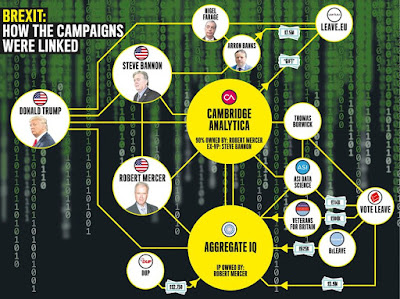 As we noted on June 11, 2016, "our initial 2016 Election Fully Adjusted Return Forecast indicates that Donald J. Trump will win the election for the Presidency of the United States" (see: "Why Trump Will Win" https://www.linkedin.com/pulse/why-trump-win-william-michael-cunningham-am-mba )
As we noted on June 11, 2016, "our initial 2016 Election Fully Adjusted Return Forecast indicates that Donald J. Trump will win the election for the Presidency of the United States" (see: "Why Trump Will Win" https://www.linkedin.com/pulse/why-trump-win-william-michael-cunningham-am-mba )
Having given on November 9, 2016 one explanation for Trump's win (https://www.linkedin.com/pulse/how-trump-won-william-michael-cunningham-am-mba), we continue to get interesting comments from persons claiming to have additional insight. I found one comment particularly interesting and thought I would share it.
“I enjoyed your analysis, but I think it leaves out a few factors.
Goldman Sachs acted as a broker for the sale of the US election. It’s why their people fill so many key positions. By applying the same type of computer programs used in high frequency trading, Goldman was able to manipulate actual vote totals. Given their knowledge of this type of trading, they identified a number of highly skilled Russian computer programmers. They presented them with an impossibility and a challenge: stealing the US presidential election by manipulating vote totals is widely considered impossible. So, how can I do exactly that?
These programmer like nothing better than a challenge presented as an impossibility (and I should know). Money is not an issue (they were, after all, bankrolled by Goldman, who put together an offering for the sale of the US election, basically, and got financing for this specific project from the wealthiest people on the planet – Theil, Mercer, Ellison, Trump, etc.).
Goldman simply brokered the deal. They brought the players together and gave them a way to get this done.
Others provided the labor and resources needed. Firms like Palantir and Cambridge Analytica, (owned by the very right wing Robert Mercer and whose motto is ‘we use data to change audience behavior’) provided data and analytics used to implement the manipulation and vote change effort. Theil and others have shown a willingness to use their platforms in service to these types of efforts. Ellison bought the firm at the center of the DDOS attack, (see: https://www.linkedin.com/pulse/how-trump-won-william-michael-cunningham-am-mba) where planted server side software allowed you to manipulate vote totals.
You described many of the key steps correctly. The DDOS attack and the use of Russian top level domains was critical to that phase of the project. One you have entry to the computer servers used to compile US votes, you need to be very smart about which votes you change. This is where firms like Cambridge Analytica come in. In addition to actually changing votes, you need to have a plausible public rationale for the outcome. This, as you noted, is where Fox News played a role.
One of the things that is interesting is that this vote manipulation software and process is still in place, ready for 2017 and 2018. Results in recent elections (Georgia (US), France) may prove this.”
Again, I don’t know if I believe all of this, but it is an interesting theory.